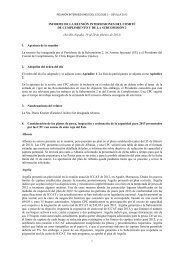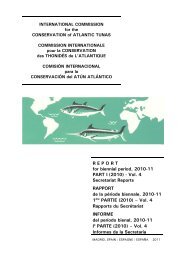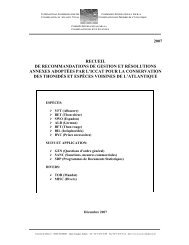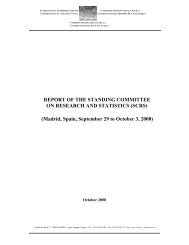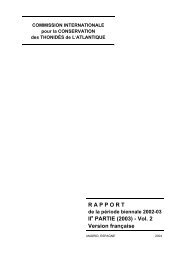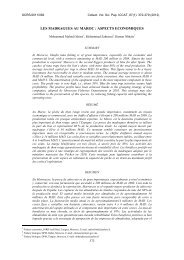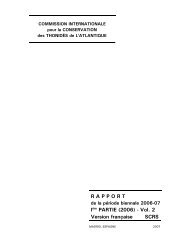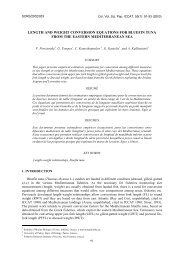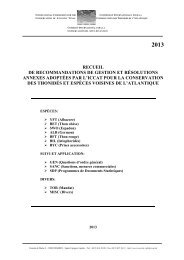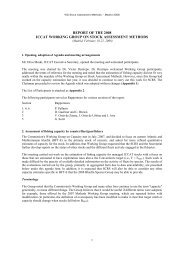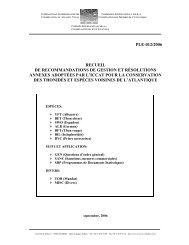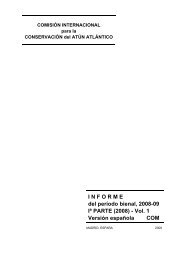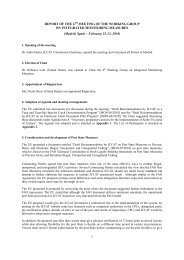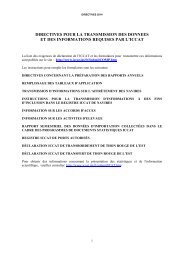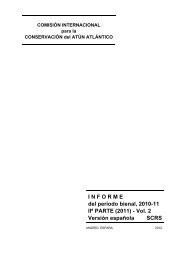E - Iccat
E - Iccat
E - Iccat
You also want an ePaper? Increase the reach of your titles
YUMPU automatically turns print PDFs into web optimized ePapers that Google loves.
ICCAT REPORT 2012-2013 (I)<br />
2) Do not increase any bluefin tuna quotas<br />
Western Atlantic bluefin: The 2012 stock assessment indicates that the western Atlantic bluefin population is just<br />
36% of the 1970 population level (SCRS/2012/033). The SCRS reports that maintaining the western Atlantic<br />
quota at the current level of 1,750 metric tons (t) would allow the population to increase, regardless of<br />
assumptions about the potential long-term productivity of the stock. Recent research also confirms that many of<br />
the fish that the SCRS counted in past assessments as western bluefin were actually eastern bluefin that migrated<br />
to the western Atlantic to feed (Block 2005; Carlsson et al. 2007; Rooker et al. 2008). Updating the stock<br />
assessment will ensure that management decisions accurately reflect the mixing of the eastern and western<br />
populations.<br />
Eastern Atlantic bluefin: A recent study shows that between 2005 and 2011, total catch of eastern Atlantic<br />
bluefin was 62% over quota and increased to 77% over quota from 2008 (SCRS/2012/144). This analysis<br />
confirmed previous reports that showed persistent illegal fishing in the Mediterranean Sea and eastern Atlantic<br />
despite stricter regulations and increased enforcement efforts (Tudela and Quilez 2012; PEW 2011; ICCAT<br />
2009). The SCRS also expressed concerns that the potential total catch of the existing fleet could easily be in<br />
excess of the current quotas (ICCAT, 2009). Pew urges ICCAT members to follow the SCRS’ precautionary<br />
management advice and not increase quotas for eastern Atlantic bluefin, now and at least until the stock<br />
assessment model reflects a more accurate tally of total fishing mortality.<br />
3) Adopt conservation and management measures to protect sharks<br />
Sharks are among the ocean’s most vulnerable animals. More than half of the shark species taken in high-seas<br />
fisheries are classified on the IUCN Red List as Endangered, Vulnerable, or Near Threatened. I CCAT members<br />
must take actions to address sharks at this year’s meeting. Until robust stock assessments are available,<br />
precautionary conservation and management measures should be developed and adopted.<br />
4) Prohibit the retention of porbeagle and other threatened and highly vulnerable shark species<br />
The IUCN’s Red List of Threatened Species assessed porbeagle sharks as Vulnerable globally, Critically<br />
Endangered in the Atlantic and Mediterranean, and Endangered in the northwest Atlantic. In addition, the<br />
ICCAT Shark Working Group has recently completed an updated Ecological Risk Analysis (ERA) that shows<br />
the porbeagle to be one of the shark species most vulnerable to ICCAT fisheries, based on its low productivity<br />
and high susceptibility to catch (SCRS/2012/167). Due to its poor conservation status in the ICCAT Convention<br />
Area and vulnerability to ICCAT fisheries, ICCAT should prohibit retaining onboard, transhipping, landing,<br />
storing, selling, or offering for sale porbeagle sharks. ICCAT should also prohibit retaining onboard,<br />
transhipping, landing, storing, selling, or offering for sale other threatened species found to be highly vulnerable<br />
by the ERA including longfin mako sharks (SCRS/2012/167).<br />
5) Establish concrete, precautionary, science-based catch limits for shortfin mako sharks<br />
According to the ERA, the shortfin mako shark is one of the shark species most vulnerable to ICCAT fisheries,<br />
based on its low productivity and high susceptibility to catch (SCRS/2012/167). Based on the ERA and a recent<br />
stock assessment, the SCRS recommended not allowing shortfin mako catch levels to increase. Therefore,<br />
ICCAT should establish concrete precautionary catch limits for shortfin mako sharks to ensure catch does not<br />
increase.<br />
6) Close loopholes in the current shark finning Recommendation<br />
Up to 73 million sharks are killed annually to support the global shark fin trade. ICCAT was the first RFMO to<br />
ban shark finning-the wasteful practice of slicing off a shark’s fins and discarding the body at sea-but loopholes<br />
still hamper enforcement of the ban. The existing ban on finning can be strengthened by prohibiting the removal<br />
of shark fins at sea, which will also facilitate collection of species-specific catch data and help ensure<br />
compliance with existing ICCAT conservation and management measures for sharks.<br />
7) Improve Compliance with ICCAT measures<br />
ICCAT has developed a set of measures to support compliance with its recommendations. However, its<br />
compliance scheme is by no means complete, nor sufficiently effective to end illegal fishing practices in the<br />
ICCAT Convention area.<br />
62



